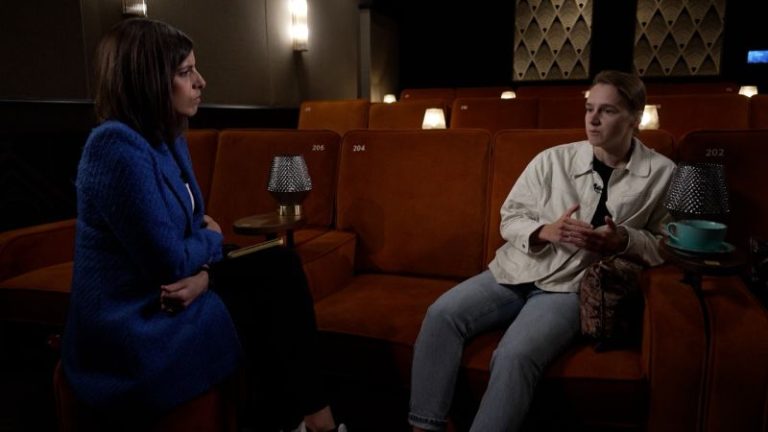Vivianne Miedema will be a notable absentee from the Women’s World Cup which starts on Thursday, with the Netherlands star – widely regarded as one of the sport’s best players – missing the four-week tournament after suffering an anterior cruciate ligament (ACL) injury in December.
Miedema, who is her country’s record goalscorer, is one of a number of players ruled out of the tournament with the knee ligament injury which has become prevalent in the women’s game.
The Dutchwoman is one of four Arsenal players – Leah Williamson, Beth Mead and Laura Wienroither are the others – who had their season ended by injuring their ACL, one of the key ligaments inside the knee.
There have been 195 ACL injuries across women soccer’s top leagues, according to the ACL Women Football Club. They include Canada’s Janine Beckie, Catarina Macario of the United States Women’s National Team and France’s Delphine Cascarino.
The 27-year-old Miedema said things would be different if that trend was replicated in the men’s game.
“Imagine having four ACLs at Man City [men’s team] this season – there would be a massive thing about it,” said Miedema, referring to Pep Guardiola’s side, which last season won the English Premier League, FA Cup and Champions League.
“I don’t think football understands athletes, so I don’t think they understand men’s football either,” Miedema added.
“The moment we start researching women’s bodies, women’s sports, we can then start saying this is what’s best for our body, this is what we need to change.”
Congested fixture list
Tearing an ACL is one of the most serious injuries an athlete can endure. The best option for repairing an ACL rupture is to have surgery and, after that, it takes between six and 12 months to return to full activity – often ruling soccer players out for entire seasons.
With players and coaches searching for answers as to why ACL injuries have become so prevalent in the women’s game, Miedema points to fixture scheduling as a key reason.
“I think if you look at the calendar, we used to play 30, 35 games a season, but now we’ve got about 60 games a season,” said Miedema.
“You’ll certainly … see a couple [ACL injuries] happen at the World Cup.”
A 2022 report into fixture scheduling by the worldwide players’ union FIFPRO, found that its sample of 85 players were likely to play an unusually high volume of games within shortened timeframes, especially in years where an international tournament is played during the northern hemisphere summer.
When Williamson – who captained England to glory at last summer’s Women’s European Championship – announced her ACL injury diagnosis in late April, she referenced having had to play with “physical or mental” doubts since October 2022.
“It’s not a coincidence I think that you get Leah and Beth injured after the Euros last summer,” said Arsenal star Miedema.
“They’ve been under a lot of pressure to perform and to keep turning up and they both got injured.”
From the Olympics in 2021 up to Euro 2025 in Switzerland, there has been and will be a major women’s international football tournament every year.
With European soccer’s domestic season concluding in late May, there is invariably a lack of recuperation time for players before these international tournaments kick off.
Miedema believes this was an issue that world soccer’s governing body FIFA must address.
“I think they’re probably the ones that can drive the change in the schedule most,” said Miedema. “I think we don’t understand that sometimes it’s about protection of players instead of getting the money in or making it entertainment.”
More help from governing bodies
A British Journal of Sports Medicine study found women to be three to six times more likely to experience an ACL injury than men.
Another study published by the medical journal Arthroscopy estimated that women’s soccer and basketball players were three times more likely to tear their ACL than their male counterparts.
Earlier this year, Arsenal women’s manager Jonas Eidevall reiterated Miedema’s calls for collective action, saying governing bodies, associations and clubs need to do more and also look at reworking the playing schedule.
FIFA has outlined its commitment to injury prevention, citing it as a key aspect of their Medical Subdivision to ensure research, education and awareness is implemented. FIFA noted a 2021 call for research, seeking to drive scientific and medical advances and understanding within the women’s game.
“The panel specifically focuses on identifying and recognizing good prevention programmes that already exist or developing new ones,” said UEFA.
Regarding ACL injuries, the FA noted the need for a “long-term overview” to evaluate the need for further actions to protect players if “some risk factors are becoming more prevalent.”
Miedema says she wanted to use her position as a star of the game to push governing bodies and soccer associations to do more to protect players’ health in the future.
“It’s really important that we keep leading by example as clubs, as players, and we help others grow with it,” said Miedema.
“I think all of us playing the games right now are a pioneer for what’s happening in 10, 12 years. I think we need to take that responsibility and help the game grow.”

